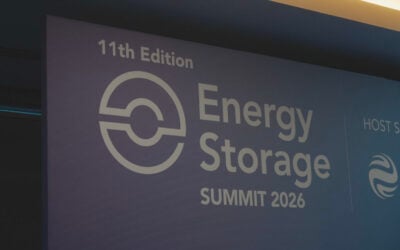The StorEdge residential range incorporates monitoring system (pictured). Image: SolarEdge.
SolarEdge, one of only two companies at present to produce Tesla Powerwall-compatible inverters, will launch its expanded range of residential and commercial solutions at Intersolar Europe next month.
The Israel-headquartered inverter manufacturer, which is perhaps best known for specialising in power optimisers which monitor a PV system at module level, will launch the most up to date version of StorEdge, a DC-coupled storage solution for the home.
Intended to go on the market by the end of this year and offered as a retrofit to anyone with a SolarEdge inverter installed since January 2013, StorEdge can manage a homeowner’s PV system and battery, allowing for maximised self-consumption while providing backup power, the company claims.
Starting with perhaps the most obvious example, Germany, the SolarEdge residential solution aims to be suited to those markets where the falling away of subsidies for solar output has led to households saving money on bills by using their own PV-generated power rather than receiving payments under a feed-in tariff (FiT).
Try Premium for just $1
- Full premium access for the first month at only $1
- Converts to an annual rate after 30 days unless cancelled
- Cancel anytime during the trial period
Premium Benefits
- Expert industry analysis and interviews
- Digital access to PV Tech Power journal
- Exclusive event discounts
Or get the full Premium subscription right away
Or continue reading this article for free
In some other regions, at present the system’s longer duration storage will only be sold on the basis of providing backup. However, as we have already seen from Tesla’s example in the past week or two, new business models for energy storage are being investigated and trialled by the EV maker and others, including its partners SolarCity in the US and utility Lichtblick in Germany.
In rarer markets where time-of-use charges exist for households, the combination of PV, battery and StorEdge can provide arbitrage i.e. saving money by buying electricity in when it is cheapest. Some commentators have predicted that time of use charges will become more prevalent throughout the world’s electricity markets in future. Residential StorEdge is expected to be made available by the end of this year, while a new range of commercial battery inverters from SolarEdge will also be launched in July.
As SolarEdge reiterated in publicity materials around the new launch, StorEdge was developed with compatibility with Tesla’s residential Powerwall battery range in mind. At present Fronius and SolarEdge are the only makers of Tesla battery-ready inverters, although the EV maker is said to be looking to widen the net and find more partners.
Meanwhile, at the much larger end of the scale, Italian renewable energy developer Enel Green Power is working with Tesla to find a pilot site where the two companies can test the integration of wind and solar plants developed by Enel, with Tesla storage systems. The partners are seeking a suitable location for a 1.5MW capacity, 3MWh output battery. The joint development programme means that while Enel is testing how well Tesla batteries can aid the grid integration of renewables, the two are also expected to collaborate to try and boost the ease of adoption of EVs. While the two parties have signed a memorandum of understanding (MoU), like Tesla, Enel Green Power appears to be taking a vendor- and technology-agnostic approach; the Italian company is also trialling storage systems from providers including General Electric, Samsung SDI, Fiamm and Toshiba.





